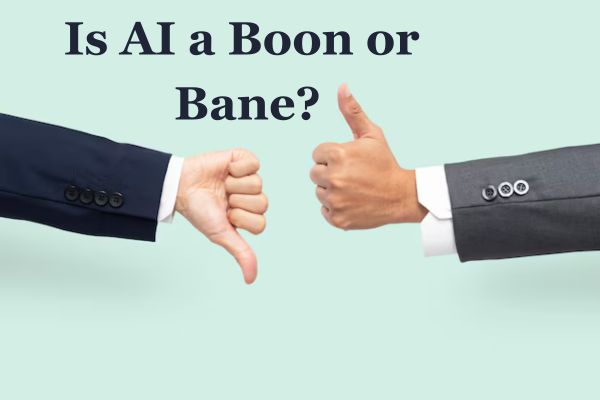Artificial Intelligence (AI) is one of the most transformative technological advancements of the 21st century. From automating mundane tasks to enhancing human decision-making, AI has reshaped industries, economies, and daily life. But is AI a boon or bane? The answer isn’t black and white. While AI brings numerous benefits, it also presents significant challenges and risks. This article explores both perspectives, providing an in-depth analysis of AI’s impact on society.
Also See: What Is the Responsibility of Developers Using Generative AI?
The Boon: How AI is Revolutionizing the World
1. Increased Efficiency and Automation
AI-driven automation has significantly improved efficiency in various industries. Tasks that once required human intervention can now be completed faster and with higher accuracy. For example:
- AI-powered chatbots provide instant customer support, reducing wait times.
- Manufacturing robots enhance productivity and minimize errors.
- AI-driven algorithms optimize supply chains, reducing costs and delays.
2. Advancements in Healthcare
AI is making remarkable strides in healthcare, from early disease detection to personalized treatment plans. Some of its key contributions include:
- AI-driven diagnostic tools that detect diseases like cancer in early stages.
- Robotics-assisted surgeries that improve precision and outcomes.
- AI-powered drug discovery that accelerates the development of new medicines.
3. Enhanced Decision-Making
Businesses and governments leverage AI for data-driven decision-making. AI processes vast amounts of data, identifies patterns, and provides actionable insights. For instance:
- AI in finance predicts market trends, optimizing investments.
- AI in cybersecurity detects threats and prevents cyberattacks.
- AI in agriculture improves crop yield predictions and resource management.
Also See: 20 Ultimate Features of Artificial Intelligence
4. Personalization and User Experience
AI enhances user experience by personalizing content and services. Examples include:
- Recommendation algorithms on platforms like Netflix and Spotify.
- AI-powered virtual assistants like Siri and Alexa.
- Personalized online shopping experiences driven by AI.
The Bane: Challenges and Risks of AI
1. Job Displacement and Economic Disruptions
While AI boosts efficiency, it also replaces jobs, particularly those involving repetitive tasks. Key concerns include:
- Automation leading to layoffs in manufacturing and customer service.
- The need for reskilling and upskilling the workforce.
- A widening gap between AI experts and those with outdated skills.
2. Ethical and Privacy Concerns
AI collects vast amounts of data, raising ethical and privacy issues. Concerns include:
- Unauthorized data collection and surveillance.
- Bias in AI algorithms leading to unfair treatment.
- The risk of AI being used for misinformation and deepfakes.
3. Dependence on AI and Reduced Human Creativity
Excessive reliance on AI can stifle human creativity and critical thinking. Some potential drawbacks include:
- Overdependence on AI-driven decision-making.
- Reduced problem-solving skills among individuals.
- The possibility of AI-generated content replacing human creativity.
4. Potential Threats and Security Risks
AI can be weaponized for cyberattacks, fraud, and warfare. Some risks include:
- AI-powered hacking tools that breach security systems.
- AI-generated fake news influencing public opinion.
- Autonomous weapons posing threats to global security.
Also See: How to Use Sora AI: Create Stunning Videos with AI
Boon vs. Bane: A Comparative Overview
| Aspect | AI as a Boon | AI as a Bane |
|---|---|---|
| Efficiency | Increases productivity and accuracy. | Leads to job displacement. |
| Healthcare | Improves diagnostics and treatments. | Raises ethical concerns about data privacy. |
| Decision-Making | Enhances data analysis and insights. | Can reinforce biases in algorithms. |
| User Experience | Personalizes recommendations and services. | Reduces human interaction and creativity. |
| Security | Detects fraud and cyber threats. | Can be weaponized for malicious activities. |
Conclusion: Striking a Balance
AI is neither inherently good nor bad; its impact depends on how we use it. While it offers groundbreaking advancements, responsible AI development is crucial to mitigate risks. Governments, organizations, and individuals must work together to ensure AI is harnessed ethically and inclusively.
